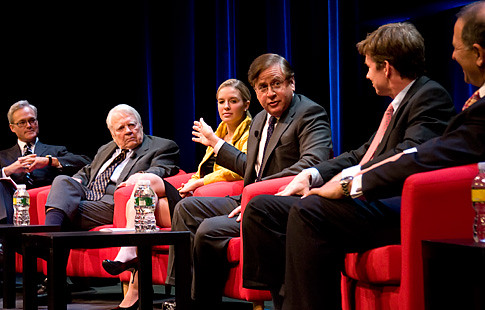Instead of flipping through the television channels to find the latest take on the presidential campaign, more than 400 people packed into New York City’s Axa Equitable Center Monday night to hear election analysis firsthand from a panel featuring ˛Řľ«¸ó alumni in the journalism field.
Newsweek chief political correspondent and senior editor Howard Fineman ’70, who has interviewed every major presidential candidate since 1984, told the audience of alumni and friends that “this has been an election of a lifetime to cover.”
“The 2008 Presidential Campaign: The Amazing Race, Part II” also included Jeff Fager ’77, 60 Minutes executive producer; Andy Rooney ’42, 60 Minutes correspondent; Tim Byrnes, professor of political science; and junior Emily Bradley.
“Never in modern political times has a presidential candidate made up the deficit in the polls that Sen. John McCain faces this late in the race,” remarked 60 Minutes correspondent Scott Pelley, moderator of the conversation.
 |
| ˛Řľ«¸ó alumni took part in a free-wheeling political discussion held in New York City. Attending were (from left) Scott Pelley, 60 Minutes correspondent; Andy Rooney ’42, 60 Minutes correspondent; Emily Bradley ’10; Howard Fineman ’70, Newsweek senior editor; Tim Byrnes, professor of political science; and Jeff Fager ’77, 60 Minutes executive producer. (Photo by Marty Heitner) |
Then, Pelley turned to Fineman: “Is the race over?”
Though the majority of recent polls indicate Sen. Barack Obama ahead of McCain in the race for the White House, Fineman said he is in no position to predict the likelihood that the political winds will shift in favor of McCain during the campaign homestretch.
“If I were to predict a winner,” he explained, “some people might be under the mistaken impression that the prediction is actually the result I want.”
“In journalism we have a duty to tell it like we see it, but we also have a duty to let people vote.”
The role of race in the election, political activism on college campuses, and negative ads also made for a lively discussion.
Sitting alongside the veteran journalists and her political science professor, Bradley was not afraid to toss her opinion into the mix. The first-time voter criticized the use of attack ads.
“The fact that we are having an economic crisis and 20 to 30 minutes of the final debate were about who said what, I found to be incredibly disappointing,” she said.
Bradley went on to describe the political activism on ˛Řľ«¸ó’s campus: “I am heartened by students’ interest in the election. Watching the debates in Donovan’s Pub with 300 students reflects how engaged we are.”
That comment sent Fineman and his former classmate Jim Smith ’70 down memory lane.
The recent gatherings in Donovan’s Pub, they said, are reminiscent of heated political discussions that took place in residence hall rooms in the 60s.
“This election has a generational turn and feel to it. The younger generation is turning back to politics, and that has not happened in a long time,” noted Fineman.